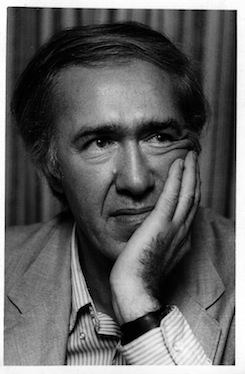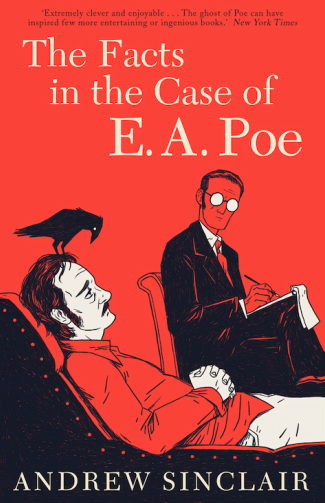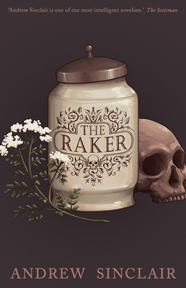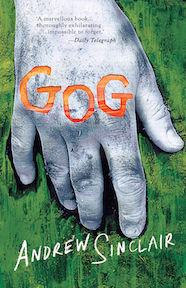|
BOOK DETAILS
Trade paper ISBN-13: 978-1939140722 List Price: $16.99 U.S. Pages: 190 Published: 2013 |
The Facts in the Case of E. A. Poe (1979)
Andrew Sinclair With a new introduction by the author Book Description
Ernest Albert Pons is a Holocaust survivor with an unusual coping mechanism: he lives in the delusion that he is, in fact, Edgar Allan Poe. His psychiatrist Dupin (chosen because he shares a name with Poe’s fictional detective) has a radical idea for treatment: Pons must see for himself that he is not Poe by retracing the poet’s steps and writing an analysis of his life. As Pons pursues Poe from his childhood and university years in Virginia to his adult life in New York, Philadelphia, and Baltimore, we gradually learn the secrets of both men’s pasts. But when Pons begins to suspect Dupin may be engineering an elaborate scheme to kill him, is it just another part of his delusion, or is Dupin plotting a macabre twist worthy of Poe? A wholly unique book that manages to blend seamlessly a page-turning thriller with an important work of Poe criticism and biography, The Facts in the Case of E. A. Poe (1979) was widely acclaimed on its initial publication and returns to print in this new edition, which includes a new introduction by Andrew Sinclair. Sinclair's The Raker (1964) is also available from Valancourt. |
reviews
‘The book is a bravura performance, exhibiting the virtuosity that has lit up all Sinclair's work.’ – C.P. Snow, Financial Times
‘This is a rich and satisfying hybrid work – part fiction and part biography. Its hold on the reader stems, at least in part, from its use of one of the most successful of literary formulae: the quest. It was this structure which gave A.J.A. Symons’s The Quest for Corvo such hypnotic appeal.... Mr Sinclair’s insights, credited to Pons, are those of a distinguished novelist. He intuitively perceives the relationship between Poe’s life and work, anatomising it in witty and sometimes brilliant prose.’ – Paul Ableman, Spectator
‘Clever, macabre, spellbinding, The Facts in the Case of E. A. Poe is Andrew Sinclair’s brilliant combination of biography and fiction, taken to the limits of the united genre.... [T]he result is a strangely disturbing and powerfully revealing piece of literature, one Poe himself – if sober – might have genuinely approved.’ – Houston Post
‘[E]xtremely clever and enjoyable, and one that Poe might himself have appreciated. Mr. Sinclair’s dovetailing of Poe’s life and Pons’s reflections is so smoothly done, and his narrative touch so delicate, that those who know nothing of Poe’s sad story are likely to be held as firmly as those familiar with it.... The ghost of Poe can have inspired few more entertaining or ingenious books.’ – Julian Symons, New York Times
‘Sinclair is one of our most intelligent novelists, and The Facts in the Case of E. A. Poe is a book full of wit, thought and perception – an ingeniousness of composition which the author of “The Raven” might have himself approved.’ – The Scotsman
‘The book (bionovel? autofictography? madnessscript?) turns out to be a thoroughly absorbing read. The use of an eccentric fictional biographer like Pons gives the “real” biographer, Sinclair, the freedom to indulge in amusingly wild flights of speculative fancy which he would no doubt have suppressed in a more conventional work.’ – The Listener
‘This is a rich and satisfying hybrid work – part fiction and part biography. Its hold on the reader stems, at least in part, from its use of one of the most successful of literary formulae: the quest. It was this structure which gave A.J.A. Symons’s The Quest for Corvo such hypnotic appeal.... Mr Sinclair’s insights, credited to Pons, are those of a distinguished novelist. He intuitively perceives the relationship between Poe’s life and work, anatomising it in witty and sometimes brilliant prose.’ – Paul Ableman, Spectator
‘Clever, macabre, spellbinding, The Facts in the Case of E. A. Poe is Andrew Sinclair’s brilliant combination of biography and fiction, taken to the limits of the united genre.... [T]he result is a strangely disturbing and powerfully revealing piece of literature, one Poe himself – if sober – might have genuinely approved.’ – Houston Post
‘[E]xtremely clever and enjoyable, and one that Poe might himself have appreciated. Mr. Sinclair’s dovetailing of Poe’s life and Pons’s reflections is so smoothly done, and his narrative touch so delicate, that those who know nothing of Poe’s sad story are likely to be held as firmly as those familiar with it.... The ghost of Poe can have inspired few more entertaining or ingenious books.’ – Julian Symons, New York Times
‘Sinclair is one of our most intelligent novelists, and The Facts in the Case of E. A. Poe is a book full of wit, thought and perception – an ingeniousness of composition which the author of “The Raven” might have himself approved.’ – The Scotsman
‘The book (bionovel? autofictography? madnessscript?) turns out to be a thoroughly absorbing read. The use of an eccentric fictional biographer like Pons gives the “real” biographer, Sinclair, the freedom to indulge in amusingly wild flights of speculative fancy which he would no doubt have suppressed in a more conventional work.’ – The Listener
ALSO AVAILABLE THROUGH ONLINE RETAILERS
MORE TITLES BY THIS AUTHOR
AUTHOR BIOGRAPHY

Andrew Sinclair was born in Oxford in 1935 and was educated at Eton and Trinity College, Cambridge. After earning a Ph.D. in American History from Cambridge, he pursued an academic career in the United States and England. His first two novels, written while he was still at Cambridge, were both published in 1959: The Breaking of Bumbo (based on his own experience in the Coldstream Guards, and later adapted for a 1970 film written and directed by Sinclair) and My Friend Judas. Other early novels included The Project (1960), The Hallelujah Bum (1963), and The Raker (1964). The latter, also available from Valancourt, is a clever mix of Gothic fantasy and macabre comedy and was inspired by Sinclair’s relationship with Derek Lindsay, the pseudonymous author of the acclaimed novel The Rack (1958). Sinclair’s best-known novel, Gog (1967), a highly imaginative, picaresque account of the adventures of a seven-foot-tall man who washes ashore on the Scottish coast, naked and suffering from amnesia, has been named one of the top 100 modern fantasy novels. As the first in the ‘Albion Triptych’, it was followed by Magog (1972) and King Ludd (1988).
Sinclair’s varied and prolific career has also included work in film and a large output of nonfiction. As a director, he is best known for Under Milk Wood (1972), adapted from a Dylan Thomas play and starring Richard Burton and Elizabeth Taylor. Sinclair’s nonfiction includes works on American history (including The Better Half: The Emancipation of the American Woman, which won the 1967 Somerset Maugham Award), books on Dylan Thomas, Jack London, Che Guevara, and Francis Bacon, and, more recently, works on the Knights Templar and the Freemasons.
Sinclair was elected a Fellow of the Royal Society of Literature in 1972. He lives in London.
Sinclair’s varied and prolific career has also included work in film and a large output of nonfiction. As a director, he is best known for Under Milk Wood (1972), adapted from a Dylan Thomas play and starring Richard Burton and Elizabeth Taylor. Sinclair’s nonfiction includes works on American history (including The Better Half: The Emancipation of the American Woman, which won the 1967 Somerset Maugham Award), books on Dylan Thomas, Jack London, Che Guevara, and Francis Bacon, and, more recently, works on the Knights Templar and the Freemasons.
Sinclair was elected a Fellow of the Royal Society of Literature in 1972. He lives in London.



